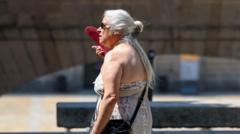Teatro alla Scala, often referred to as La Scala, has implemented strict enforcement of its dress code policies this summer, prohibiting patrons from wearing flip-flops, tank tops, and shorts to performances. While many venues have relaxed their attire expectations, La Scala insists on maintaining a sense of decorum. With age-old traditions at risk of fading, the opera house balances the need to welcome a wider audience with the desire to preserve its sophisticated atmosphere.
La Scala Enforces Dress Code: No Flip-Flops or Tank Tops This Summer

La Scala Enforces Dress Code: No Flip-Flops or Tank Tops This Summer
Milan’s renowned opera house raises concerns about attire while aiming to attract younger audiences.
La Scala is making a fashion statement in the world of opera, declaring that visitors must adhere to a dress code that reflects the theater's grandeur. The venue has taken measures to remind audience members to dress appropriately through signs displayed in the foyer, and explicit warnings are included on tickets—those who come underdressed will not be allowed entry or receive refunds.
In a statement, Paolo Besana, a spokesman for La Scala, emphasized the necessity of establishing “some minimum rules” to ensure inclusivity while still adhering to the venue’s longstanding sartorial standards. This initiative reflects a broader trend among European opera houses grappling with how to attract younger demographics while retaining the elegance and experience of a night at the opera.
Joiners in this dress code debate include John Allison, editor of Opera With Opera News, who acknowledges that while jeans may be acceptable in informal settings, attending opera often represents a special occasion for patrons. Others, like critic Andrew Mellor, argue that the focus should solely be on the performances rather than on the attire of attendees. As La Scala gears up for its summer season, it remains to be seen whether the stricter dress code will deter or entice modern audiences to experience the magic of opera.
In a statement, Paolo Besana, a spokesman for La Scala, emphasized the necessity of establishing “some minimum rules” to ensure inclusivity while still adhering to the venue’s longstanding sartorial standards. This initiative reflects a broader trend among European opera houses grappling with how to attract younger demographics while retaining the elegance and experience of a night at the opera.
Joiners in this dress code debate include John Allison, editor of Opera With Opera News, who acknowledges that while jeans may be acceptable in informal settings, attending opera often represents a special occasion for patrons. Others, like critic Andrew Mellor, argue that the focus should solely be on the performances rather than on the attire of attendees. As La Scala gears up for its summer season, it remains to be seen whether the stricter dress code will deter or entice modern audiences to experience the magic of opera.






















